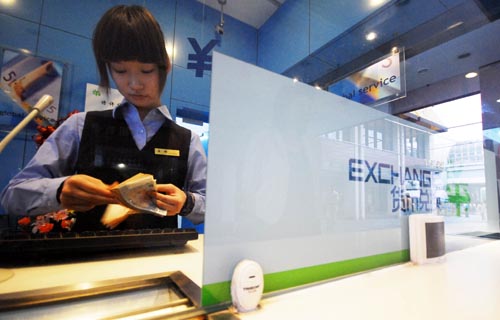Foreign capital rules eased
By Wang Xiaotian (China Daily) Updated: 2012-11-22 09:21
|
 |
|
A currency exchange in Shanghai. From Dec 17, foreign investors will no longer need regulatory permission to open bank accounts, to remit profits abroad and transfer money between different domestic accounts. [Photo/China Daily] |
China will clear the way for foreign investors' capital to flow in and out of the country more easily by waiving and simplifying regulations, the State Administration of Foreign Exchange, or SAFE, said on Wednesday.
In a statement published on its website, SAFE said that there's no evidence to suggest that the nation is seeing pressure from capital inflows, although the yuan has strengthened in recent weeks, mainly driven by increasing optimism about China's economic outlook.
Starting on Dec 17, foreign investors won't need to get regulatory approval to open bank accounts, remit profits, and transfer money between different domestic accounts, it said.
And the limits on the number of foreign-currency accounts and the amount of money that can be transferred will also be loosened, it added.
"We're making some progress in further opening up the capital account. Maybe it can't be called a 'big leap', but it shows that the government is determined to make the financial system more free and open, although it faces capital inflow challenges," said Guo Tianyong, a finance professor at the Central University of Finance and Economics in Beijing.
SAFE said it will cancel 35 rules on regulatory approval and simplify 14 others.
"The move is clearly designed to encourage long-term capital inflows, especially when short-term money flows are volatile," said Joy Yang, chief Greater China economist at Mirae Asset Securities (HK) Ltd, quoted by Bloomberg.
In October, foreign direct investment in China declined for the 11th time in 12 months. In the first 10 months, it went down nearly 3.5 percent, according to data released by the Ministry of Commerce on Tuesday.
Analysts said that short-term speculative capital inflows have increased in recent months and drove the yuan to appreciate to record highs for several consecutive days.
However, the recent figures don't prove that the capital inflow pressure on China is significantly increasing, SAFE said.
Individuals and companies sold $125 billion of foreign currency through banks and bought $117.2 billion last month, leaving a net sale of $7.8 billion, according to data released by SAFE on Wednesday.
In October, the forward contracts of bank clients showed a net purchase of $600 million of foreign currency, it said.
An improvement in international financial markets coupled with China's relatively rapid economic growth will make it easier for the country to attract long-term and stable capital inflows, while uncertainty in the global economy and unstable market sentiment might cause more short-term volatility, SAFE said.
It added that as domestic companies continue to expand overseas, capital outflows are expected to increase in the future.
The move to facilitate capital flows related to direct investment came the day after Zhou Xiaochuan, the central bank governor, vowed to improve capital account convertibility.
The validity of capital controls has been declining as financial opening-up deepens, and China needs to further open up its capital account by extending convertibility for certain transactions and individuals, Zhou said on Tuesday.
Convertibility for direct financing, direct investment and credit operations should be further facilitated, Zhou said.
wangxiaotian@chinadaily.com.cn
- China's Zhu to leave IMF post in July
- Apple's loss signals rise of IP-minded China firms
- McDonald's gets bids for China store sales
- Top 10 best employers in China 2016
- Singapore includes RMB investments as part of Official Foreign Reserves
- Volkswagen to recall 5,462 vehicles
- China's mutual fund market grows in May
- Sansiri, SouFun plan Thai website to attract Chinese investors


















